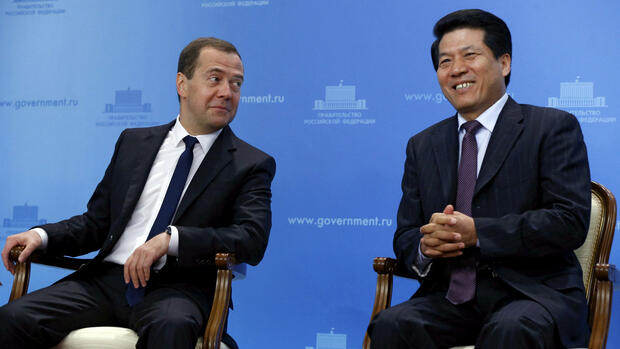Li Hui himself has close ties to Moscow. His affinity first with the Soviet Union and then with Russia characterized his entire career.
(Photo: Reuters)
Berlin Russia’s President Vladimir Putin smiles contentedly for the cameras as he shakes hands with Li Hui. The Chinese diplomat wears a small award on the lapel of his suit jacket: the Russian “Order of Friendship”.
It has been almost four years since Putin personally thanked the then Chinese ambassador in Moscow for his services to the friendship between the two countries. Today, Li Hui is on the road on behalf of the Chinese government as a special envoy in the “Ukraine crisis”, as China calls the Russian war.
In the last few days, Li has been on a tour of Europe: first he met with Ukrainian President Volodymyr Zelenskiy, then he traveled on to Poland. This week Paris was on his agenda first, followed by Berlin on Wednesday, where he met the State Secretary at the Federal Foreign Office Andreas Michaelis as well as the Director for Asia Petra Sigmund and the Political Director Tjorven Bellmann. Nothing was initially known about the content of the conversation.
Kiev and its allies received the former Chinese Deputy Foreign Minister Li with skepticism. Because China has been close to Russia since the beginning of the war and supports Putin both politically and economically.
Li himself also has close ties to Moscow. His affinity first with the Soviet Union and then with Russia characterized his entire career. He was Chinese ambassador in Moscow for ten years – no Chinese diplomat before him had held this post for so long.
Russia and China expand economic relations
On his farewell in 2019, Li Hui wrote an op-ed piece for the Russian state news agency TASS entitled “The green hills never grow old and the friendship lasts forever”. Now Li is supposed to show Europe that China is interested in peace in Ukraine and that the country is a responsible world power. The fact that Beijing has been firmly on Putin’s side since the Russian invasion caused serious irritation in the European capitals.
While he is shunned by democratic governments, China’s head of state and party leader Xi Jinping only visited the Russian president for several days in Moscow in March. On Wednesday, Russian Prime Minister Mikhail Mishustin met with his Chinese counterpart Li Qiang in Beijing.
>> Read also here: How the EU is preparing for a conflict with China
In fact, not only are diplomatic relations very close, China and Russia have also significantly expanded their economic ties since the beginning of the war. Trade between the two countries has increased by 36.5 percent in the past 15 months compared to the pre-war period, according to the investment bank Natixis.
Poland in particular was skeptical about the Chinese special envoy. “We support President Zelenski’s peace plan as a basis for resolving the conflict,” Polish Deputy Foreign Minister Wojciech Gerwel said after his meeting with Li on Friday. The withdrawal of Russian troops and the return of territories illegally confiscated by Russia are the only acceptable solution to achieve a just peace, he warned. Kiev expressed similar determination to Li Hui.
Friendlier words came from Paris on Tuesday. France is convinced that China “can play a constructive role in returning to a just and lasting peace in Europe,” the French foreign ministry said after Li’s meeting with a French foreign ministry official.
Nobody in the European capitals wants to give the impression that everything is not being tried, that the war in Ukraine is ending. However, the initial hope that China could use its influence over Russia to force Putin to withdraw his troops has given way to general disillusionment. No one seems to seriously believe anymore that China can really mediate neutrally or that it wants to, given its pro-Russian stance.
More: Siemens supports China’s defense industry
